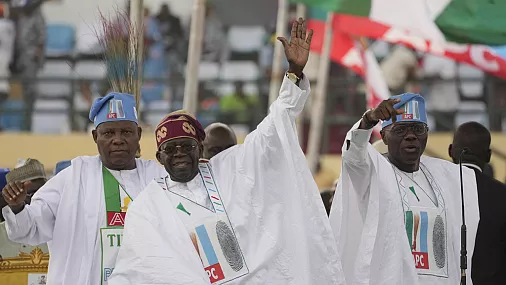Insecurity awaits Nigeria’s Bola Tinubu
The resurgence of massive attacks by criminal and jihadist groups in Nigeria, a time slowed down during the electoral period, is a cruel reminder of the immense challenges that await the new President Bola Tinubu as of Monday at the head of the most populous country in Africa.
This violence is also a scathing illustration of the failure of outgoing President Muhammadu Buhari, a former coup general in the army, who was democratically elected in 2015 and 2019 with the promise of bringing peace to Nigeria.
Because not a week, not a day goes by without large-scale attacks by criminal groups (in the north-west and center), jihadists (in the north-east), or separatists (in the southeast) mourn the West African giant, yet one of the most dynamic countries on the continent.
Their frequency and intensity threatened the presidential, legislative, and regional elections of February and March. A relative calm observed during the election period had surprised everyone, and allowed the holding of these elections, even in the most volatile regions.
It made possible the election of Bola Tinubu, who is to be sworn in on Monday, although the results are being challenged in court by the opposition, which denounces massive fraud by the ruling party.
This lull was short-lived, however, because from April the sound of arms resumed with ever greater force.
For two months, the list of attacks seems endless: more than 100 dead and 3,000 displaced after clashes between communities, 25 worshipers kidnapped in a church, five soldiers killed in the explosion of a mine…
“As soon as he takes office, the new president will face significant security problems,” notes Emeka Okoro, security analyst for the analysis group SBM Intelligence, and he will have to tackle three major fronts.
The most urgent and priority is that of central and northwestern Nigeria, according to Mr. Okoro. In these agricultural and poor regions, the fierce competition for land frequently degenerates into deadly clashes between farmers and herders, where the absence of justice and protection from power has contributed to the birth of armed gangs, responsible for mass killings and kidnapping for ransom.
The army says it is carrying out operations against these “bandits”, but the results are struggling to be felt.
“The bandits invade a community, kill the inhabitants, and destroy their property, with little or no resistance from the security forces, who only appear on the spot long after to look at the ashes”, denounced in mid-May Muhammadu Sa’ad Abubakar III, Sultan of Sokoto, one of the most heavily attacked regions.
During his campaign, Mr. Tinubu promised, once elected, to end the violence by reforming the armed forces to make them “more robust”, by increasing recruitment, training, and their equipment.
For researcher Idayat Hassan, director of the Center for Democracy and Development (CDD), the new administration will have to move away from “the enemy-centric, weapon-centric approach”, which prevailed under President Buhari, to “adopt a non-military approach”, tackling the underlying problems, such as “unemployment, poverty, the fight against marginalisation”. She insists on the urgency of “reforming justice”.
Another front on which Mr. Tinubu is eagerly awaited, the jihadist conflict which has been raging for 14 years in the northeast of the country having left more than 40,000 dead and 2 million displaced.
Under the presidency of Buhari, the army has certainly succeeded in reconquering many territories taken by the group Boko Haram, but the rival group Islamic State in West Africa (ISWAP) has also been reinforced.
The choice of Mr. Tinubu’s vice-president in the person of Kashim Shettima, former governor of Borno State, epicenter of the insurgency, can “make a big difference”, hopes Ms. Hassan, even if some criticize him for to have allowed Boko Haram to grow under his governance.
Finally, in the south-east of Nigeria, Mr. Tinubu will have to face an agitation of separatist groups, which attack the police in large numbers, and where the population feels marginalized.
The situation is unlikely to improve, thinks Ms. Hassan, as the defeat in the presidential election of candidate Peter Obi, from this region, has caused immense disappointment.
Finally, many Nigerians hope that the new administration will put an end to the serious abuses committed by security forces across the country, and widely documented by human rights organizations.
Tel Human Rights Watch, which urges the new president to reverse “significant human rights setbacks” seen under the Buhari mandates.





















































